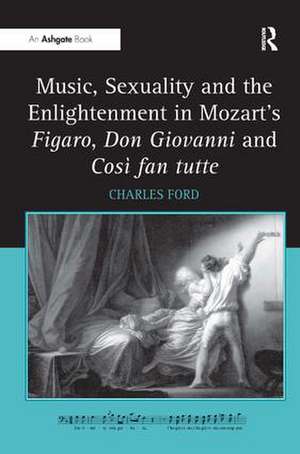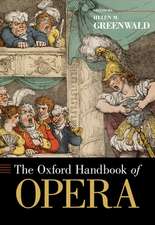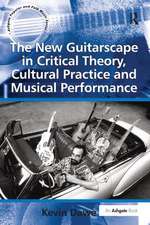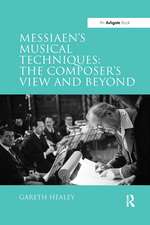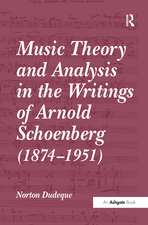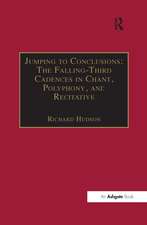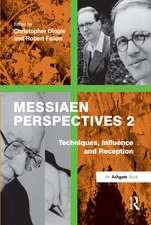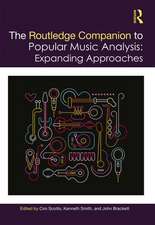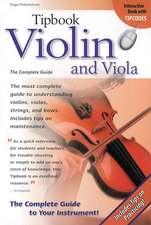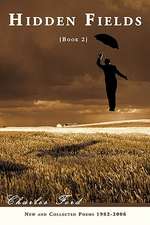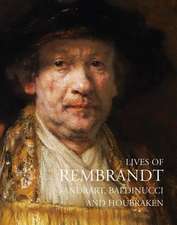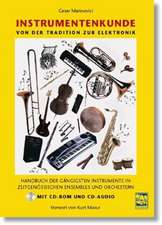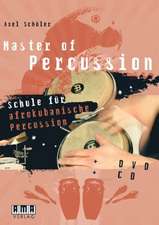Music, Sexuality and the Enlightenment in Mozart's Figaro, Don Giovanni and Così fan tutte
Autor Charles Forden Limba Engleză Hardback – 28 mai 2012
| Toate formatele și edițiile | Preț | Express |
|---|---|---|
| Paperback (1) | 449.41 lei 6-8 săpt. | |
| Taylor & Francis – 9 sep 2016 | 449.41 lei 6-8 săpt. | |
| Hardback (1) | 337.80 lei 3-5 săpt. | +40.08 lei 7-13 zile |
| Taylor & Francis – 28 mai 2012 | 337.80 lei 3-5 săpt. | +40.08 lei 7-13 zile |
Preț: 337.80 lei
Nou
Puncte Express: 507
Preț estimativ în valută:
64.64€ • 69.12$ • 53.89£
64.64€ • 69.12$ • 53.89£
Carte disponibilă
Livrare economică 27 martie-10 aprilie
Livrare express 13-19 martie pentru 50.07 lei
Preluare comenzi: 021 569.72.76
Specificații
ISBN-13: 9780754668893
ISBN-10: 0754668894
Pagini: 350
Ilustrații: Includes 7 b&w illustrations and 134 musical examples
Dimensiuni: 156 x 234 x 21 mm
Greutate: 0.79 kg
Ediția:New ed
Editura: Taylor & Francis
Colecția Routledge
Locul publicării:Oxford, United Kingdom
ISBN-10: 0754668894
Pagini: 350
Ilustrații: Includes 7 b&w illustrations and 134 musical examples
Dimensiuni: 156 x 234 x 21 mm
Greutate: 0.79 kg
Ediția:New ed
Editura: Taylor & Francis
Colecția Routledge
Locul publicării:Oxford, United Kingdom
Notă biografică
Charles Ford is an associate fellow of the Institute of Musical Research, University of London, UK
Recenzii
'In this highly nuanced and multi-disciplinary study, Charles Ford shows us how tonal identifications foster nonconceptual forms of significance. Through music we feel, and through feeling we come to know (and know how to make) difference. Ford guides us adroitly, aria by aria, scene by scene, in Mozart's art of tonal identification. Music, Sexuality and the Enlightenment illuminates music as an insidious and insinuating medium of social performance.' Tia DeNora, University of Exeter, UK 'Charles Ford's new book is a major contribution to writing and thinking about a body of music that continues to occupy a highly influential position in musical culture. The book achieves a synthesis of musical detail, interpretation, and ideological framing of a remarkable kind, which demonstrates - contrary to simplistic notions of the Enlightenment - how fascinatingly contradictory, unstable and shot-through with conflict the music, thought and writing actually are.' Eric Clarke FBA, Oxford University 'Ford's excellent analysis succeeds in illuminating how the operas depict the complex relationship between gender roles, sexuality, and desire as it plays out in the music... Ashgate has produced an excellent volume which is readable, well laid out, contains few typos and is intelligently organized... The book will become a valued contribution to our understanding of Mozart.' New perspectives on the Eighteenth Century '...a worthwhile contribution to Mozart studies and eighteenth-century opera studies... ' Intersections
Cuprins
List of Figures and Tables, List of Music Examples, Notes on the Text and Acknowledgements, Part I. Overtures, 1. Introduction, 2. Enlightenment as Negative Freedom, 3. Enlightened Music, Part II. Masculine Music, 4. Music of Enlightened Masculinity, 5. Angry Masculine Music, 6. Libertinage and Musical Libertinage, 7. The Enlightenment’s Legitimation of Feelings, 8. Sensitive Masculine Music, Conclusions to Part II: The Differentiation of Masculine Music, Part III. Feminine Music, 9. Music of Enlightened Femininity, 10. Sorrowful Feminine Music, 11. Hysterical Feminine Music, 12. Music of Feminine Moral Frailty, 13. The Musical Ridicule of Female Intentions, 14. Two Maids’ and a Peasant Girl’s Music, Conclusions to Part III: The Differentiation of Feminine Music, Part IV. Seductions, 15. Simple Musical Seductions, 16. Complex Musical Seduction: Fiordiligi and Ferrando, Part V. Finales, 17. Five Finales, 18. Don Giovanni and the Stone Man, 19. Kant, Sade and Don Giovanni, 20. Così fan tutte, Act II Finale, 21. The Futures of the Operas, Bibliography, Music Examples, Index
Descriere
This analytical study explains how Mozart's music for Le Nozze di Figaro, Don Giovanni and Così fan tutte 'sounds' the intentions of Da Ponte's characters and their relationships with one another. Mozart did not merely interpret Da Ponte's characterisations but lent them temporal, musical forms. Charles Ford's analysis presents a new method by which to relate the music of the operas to the thinking of the European Enlightenment, involving close readings of late eighteenth-century understandings of 'man' and nature, self and other, morality and transgression, and gendered identities and sexuality.
